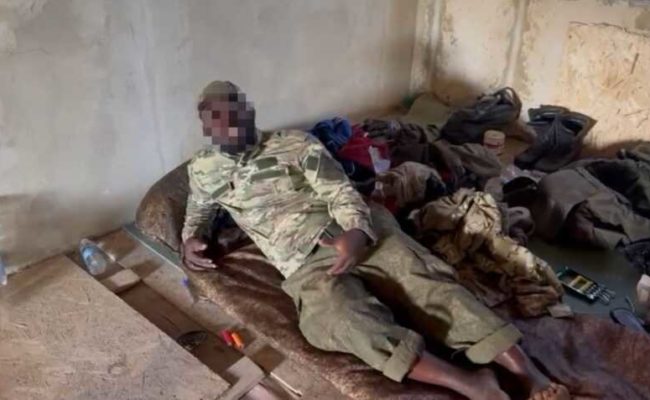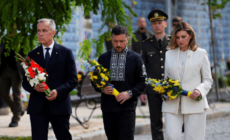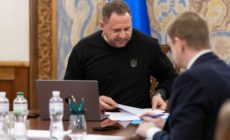Trapped in ‘hell’: Ghanaian men forced into Russia’s war in Ukraine
- Posted on
- Comment

“I don’t know if I’ll survive another day. I fear I may die,” whispered one Ghanaian man, his voice frail and trembling. He recounted the horrors of being trapped on the frontlines of Russia’s war against Ukraine, painting a chilling picture of the ordeal faced by 14 Ghanaians.
These men left home with dreams of better opportunities, only to find themselves caught in a conflict they neither understood nor chose to fight.
Michael, 33 (not his real name), trapped at the frontline of the Russia- Ukraine war was a phone dealer at the bustling Kwame Nkrumah Circle in Accra. In June 2024, frustrated by his financial struggles, he saw an opportunity that he believed could change his life. “I borrowed 20,000 GHS from family members and added it to my savings to pay for the visa and flight,” he said.
Another victim, Joseph (not his real name, also trapped on the frontlines in Donetsk, added, “We paid the money to our agent because we trusted him. He’s my nephew.”
The group of 14 men was allegedly lured by promises of high-paying security and agricultural jobs in Russia, allegedly arranged by one Abraham Boakye. They paid their way, traveling through Togo before arriving in Russia on August 6, 2024, filled with hope. But their dreams quickly shattered upon reaching Kostroma, northeast of Moscow.
Instead of securing jobs, the men said they were told they needed military training before starting work. A Russian team took charge of them, presenting a contract written entirely in Russia, a language none of them understood. Shortly after signing, their passports were confiscated. They were trained for 21 days and were transported to the Russian-occupied Donetsk oblast in Ukraine. This was the beginning of their nightmare.
Three of the men, who managed to communicate with this journalist, described being held against their will and forced into dangerous roles supporting Russia’s war efforts. They were tasked with delivering bombs to the frontlines and carrying the lifeless bodies of fallen soldiers. A three-hour trek on foot to the frontline became a daily ritual, drenched in fear and despair.
One of them at the frontline of the war described his deteriorating health, saying, “I can’t stand without assistance. They inject me with substances to keep me going. I just want to go home, he told the journalist on phone.
The journey has left scars deeper than physical wounds. Many of their comrades are dead, missing, or living with life-altering injuries. Back in Ghana, their families live in anguish, appealing to authorities for help but receiving no tangible response.
Adjei (not his real name), one of the men, had left his wife and two children in Ghana, hoping to brighten their future. After his first payment of 400,000 rubles, he sent money home to keep his promise. His colleagues Michael and Joseph (not their real names) also sent money to create the illusion that all was well, sparing their families the grim reality.
But the men have grown weary. “We are tired,” they said. Their families are equally frustrated. Despite numerous reports to the Ghana Police Headquarters, no action has been taken.
Gideon Sarfo, nephew of Michael, expressed his frustration: “We’ve been waiting for answers, but all we get are closed doors and broken promises. My uncle’s life is at stake, and no one seems to care.”
Michael’s mother, battling her own health issues, is devastated. “She’s had a stroke and asks about him every day. If she learns the truth, it might kill her,” a family member shared.
Escaping the War
A few men have managed to escape, risking their lives to return to Ghana. One escapee described their perilous journey through dangerous terrain, avoiding Russian forces. “We saw our friends die before our eyes. We didn’t want to experience the same fate. We fought our way out,” one said.
However, upon arrival, they were detained by Ghana’s Bureau of National Investigations (BNI) for questioning. Though later released, their identification documents were confiscated, and they now live in hiding, fearing further repercussions. When approached for an interview in Kumasi, the men refused to meet, suspecting I could be working with the Bureau of National Investigations (BNI). Their paranoia underscores the deep trauma they endured.
Efforts to reach the Ministry of Foreign Affairs by visiting their office in Accra and the Ghanaian Embassy in Russia by writing them an email have yielded no response. Sources indicate both entities are aware of the situation but have failed to act.
Individuals or NGOs working on human trafficking and forced labor who want to remain anonymous have expressed outrage. “This is a textbook case of labor exploitation and trafficking,” said a representative from the International Justice Mission. “These men were deceived and coerced, making their forced participation in the war a violation of international law.”
Russia has increasingly turned to foreigners and migrant workers to fill its ranks, aiming to avoid domestic mobilization as losses in Ukraine mount. The Institute for the Study of War reports a surge in deceptive recruitment tactics targeting economically vulnerable individuals from Africa and Asia.
For these Ghanaian men, their plight highlights not just the horrors of war but also the pervasive exploitation of migrants. Security analyst Adib Saani warned, “If no immediate action is taken, this could escalate into a larger security threat for Ghana.”
Lawyer Christian Malm Hesse added, “If these men were coerced, it constitutes a breach of international law. However, if they signed contracts and accepted payment, it complicates their case.”
Meanwhile, efforts to locate Abraham Boakye, the alleged recruiter, have been futile. His office in Dome, Accra, remains locked following news of investigations into the case.
To make matters worse, Boakye allegedly took 130,000 rubles from each man’s first salary of 400,000 rubles, compounding their misery.
For these men, what began as a journey toward a better life has turned into a desperate plea for survival. Each passing moment deepens their despair as they hope for a rescue that seems increasingly out of reach.
The world cannot afford to remain silent. These men need action, not tomorrow, but now.
-3news










 (Selorm) |
(Selorm) |  (Nana Kwesi)
(Nana Kwesi)